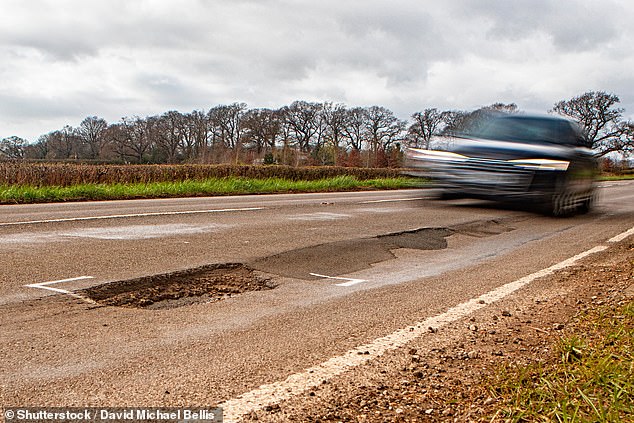Britain’s road crisis continues with almost 70 per cent of drivers reporting potholes in their area as “very severe” or major in a new report.
In another blow to motorists, around 10 percent of respondents said craters in their local area are never resolved.
While all areas have pothole problems, the data suggests that those in the southwest report the most severe cratering of all.
A survey of 2,000 people found that nearly 70% describe the pothole crisis where they live as “very serious” or major, according to a new report
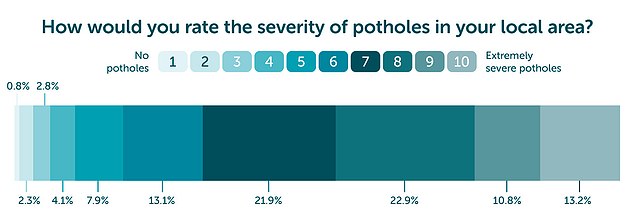
In a survey of 2,000 people across the UK, potholes were rated on a scale of 1 (no potholes) to 10 (extremely severe potholes).
The study found that 68 percent said potholes were “bad” where they live: 22 percent rated the craters as 7/10, 23 percent rated them as 8/10, 10 percent said 9/10, and 13 percent reported the potholes as an alarming 10/10.
Only 6 percent of respondents rate the severity of potholes in their neighborhood at 3 or less on the scale.
Some people in Northern Ireland are very satisfied with the quality of their road surfaces, with the largest number of people saying there are no potholes in their local area – 3 per cent.
However, other residents had contrasting views: 14 per cent had extremely severe potholes, showing the huge disparity between the road maintenance of different councils.
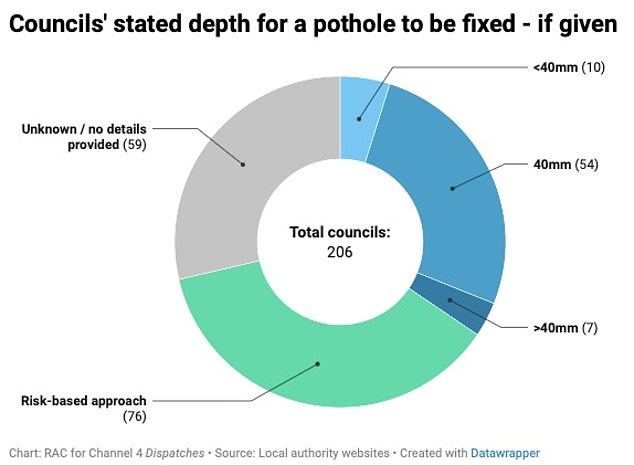
The research found a variety of different approaches by 206 councils when it comes to identifying and repairing potholes.
This is Money recently reported how a report by the RAC and Channel 4 Dispatches reveals that whether potholes are fixed or not is entirely down to the council’s own discretion.
What is considered to require repair can vary widely from region to region, and there are no national criteria.
The research found that a third of councils only fix potholes when they reach a specific depth, regardless of their width, meaning many dangerous potholes are left unrepaired.
The results highlight this even further, especially in the case of Scotland.
The speed with which potholes are fixed in Scotland varies significantly between councils within the same city: 21 per cent of respondents in Edinburgh and 10 per cent in Glasgow said potholes were fixed within a month.
However, at the same time, 29 per cent of Glaswegians also said potholes where they live were resolved very slowly, as did 26 per cent in Edinburgh.
Some Glaswegians had it even worse: 11 per cent of respondents said nearby potholes had never been fixed.
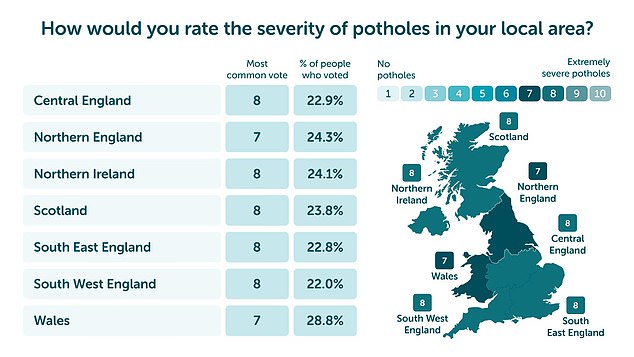
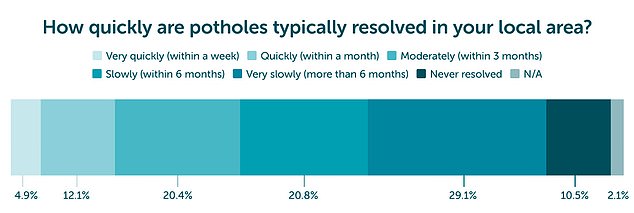
Data from Moneybarn Finance suggests that southern residents tended to fare better in the bumpy postcode lottery.
Potholes in London are fixed relatively quickly, according to respondents: 9 percent say potholes in their local area are resolved within a week.
Bristol followed closely behind, with 6 percent of respondents reporting similarly quick resolution times.
Other major English cities, including Manchester, Nottingham, Birmingham, Liverpool and Leeds, also feature in the top positions. In each of these locations, almost 5 per cent of respondents said that potholes are usually fixed within a week.
This latest report comes after it was revealed in April that the UK’s pothole epidemic is intensifying, with the RAC dealing with 10 per cent more breakdowns resulting from drivers driving through potholes than it was a year ago.
By the end of March this year, the RAC had received some 27,205 callouts about breakdowns due to poor road conditions in the UK, compared with 24,906 in the previous 12 months, the motoring services firm said.
The RAC has estimated that there are more than one million potholes in the UK.
Last week, a damning report by the National Audit Office into the condition and maintenance of local roads found that the Department for Transport (DfT) is unaware of the state of English roads after limiting the data it collects on local roads to reduce its administrative burden.
The report concluded: ‘There is no reporting requirement for unclassified roads, which make up 62 per cent of the local network, although around 70 per cent of local authorities provided this data in 2023.
“This means the DfT does not hold information about large parts of the network.”
The DfT spent £1.1bn in the 2022/23 financial year but “does not know” what impact this has had on England’s roads and bridges.
Responding to the audit, AA president Edmund King said: “The NAO report is a damning indictment of the state of the UK’s local roads and their maintenance. The condition of local roads has been getting worse, but delays are mounting and the budget has been shrinking.
‘Before the election, 96 per cent of AA members cited poor road conditions as their main transport problem.’
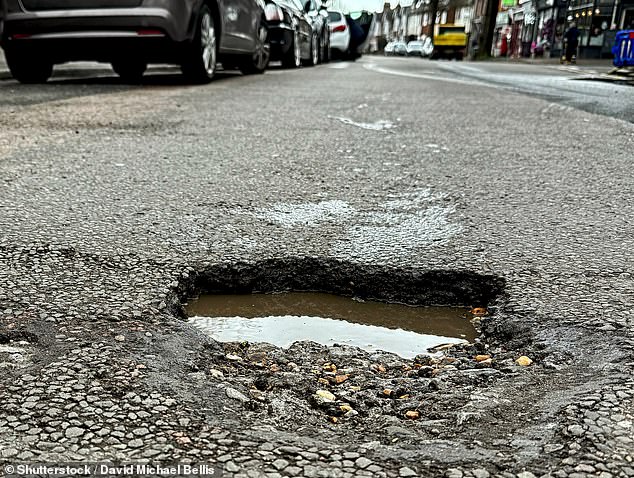
A damning report by the National Audit Office into the condition and maintenance of local roads last week found that the DfT is unaware of the state of English roads after limiting the data it collects on local roads to reduce its administrative burden.
Concern in the road haulage industry about the state of the UK’s roads has only grown further after the Chancellor said she will delay investment in road infrastructure due to overspending by the previous government.
Among the projects being cancelled is the A303 Stonehenge tunnel.
Rachel Reeves announced a series of sweeping cuts to plug a “£22bn hole in public spending” which “creates more questions than answers about when exactly we will start to see the Government improve the condition of Britain’s broken roads”, said RAC policy chief Simon Williams.
With no mention of whether the cancelled northern section of HS2 (an £8.3bn fund) will be spent on local road maintenance (as promised by the previous government), the funding plan for the next decade remains unclear.
Williams added: “It is this long-term funding certainty that local authorities desperately need to plan long-term maintenance programmes, resurface their worst roads and carry out preventative treatments that prevent potholes from forming in the first place.”
Jakob Pfaudler, chief executive of the AA, said: ‘We understand that the Government needs to make savings and we would prefer to see this come from major infrastructure projects such as the delay of the A303 Stonehenge tunnel rather than a commitment to funding and fixing roads to eliminate the scourge of potholes.
‘By far the most important issue for 96 per cent of AA members, in terms of transport policy, is the state of roads, so while we understand that some long-term projects will be delayed, we still need the Government’s commitment to secure more long-term, targeted funding for more permanent repairs to our roads.’
Some links in this article may be affiliate links. If you click on them we may earn a small commission. This helps us fund This Is Money and keep it free to use. We do not write articles to promote products. We do not allow any commercial relationships to affect our editorial independence.

